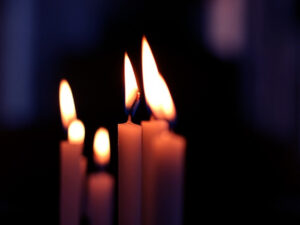The coming of the light

Almost every morning I walked in the dark, my head lamp illuminating the way ahead, but just barely. In Spain, even as early as late September when I started the 500-mile Camino Francés, dawn came later than I was used to. By the third week of October, as I was nearing the end, the sky didn’t lighten until close to 9 am.* And I was walking west, facing the darkest edge of the sky.
I am unaccustomed to walking without fear in the dark. What woman walks without fear in the dark? Some inky mornings I would walk for an uncomfortable distance without seeing the familiar waymarker, that bright yellow arrow announcing I was headed the right way. Some mornings, walking out of small villages into the black pre-dawn, I would see up ahead a dim light, the head lamp of a pilgrim in front of me. That sense of being alone but not alone was one of the core experiences of this journey. To be both solitary and connected, self-sufficient yet dependent. It’s hard to recapture that now, yet it was my everyday life then.
Occasionally, especially navigating through city streets I would get lost. Getting out of Burgos, I was spectacularly lost. I was without cell service, without maps, both a terrifying and a liberating experience. When I finally did come upon an embedded shell-marker in the pavement, my relief was so overpowering I believe I may have cried.
Sometimes I was so intent on looking ahead into the darkness, of navigating the uncertainty, of needing reassurance that I was on the right path, I forgot that the dawn was happening behind me. And then I turned, and there it was: a soft gray flannel rim to the sky, or lemon yellow streaks, or once the pale blue and pink of a baby’s room. And boom. If that is not a life lesson, my friends, I don’t know what the hell is.
It took some time to learn to embrace these mornings. But after a while, the pre-dawn hours were the most glorious, empowering moments of the long day.
I write about this today, Winter Solstice, the latest dawn, the longest night, reminding myself, reminding us all, about the coming of the light.
*Spain’s clocks have been set to Central European time since World War II, which means the sun rises considerably later compared to countries in its region.






0 comments
Kick things off by filling out the form below.
Leave a Comment